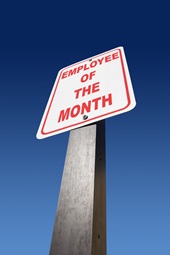"Twice and thrice over, as they say, good it is to repeat and review what is good." -- Plato, ancient Greek philosopher. We've all undergone job performance reviews. Ideally, you experience them at least once a year—hopefully more often if your organization keeps a tighter rein on strategic alignment. As a manager, you've probably conducted any number of them on your own employees. Until a few years ago, such evaluations went in one direction only: downward. All criticisms, praise, and suggestions came from leadership to team members. In recent years, however, the workplace has begin to evolve away from the "Me Boss, You Not" attitude. Professional work has become more of a collaborative affair. Many managers lead by consensus and example, rather than by handing down edicts from senior … [Read more...]
Undeniable Competence: How to Be Superb at What You Do

"No human being will work hard at anything unless they believe that they are working for competence." -- William Glasser, American psychiatrist. "Whenever you are asked if you can do a job, tell 'em, 'Certainly I can!' Then get busy and find out how to do it." -- Theodore Roosevelt, 26th President of the United States. Competence. These three syllables mean everything in business, art, and industry alike, embodying as they do an individual's overall capability as a practitioner of their chosen field. Like the older terms "able seaman" or "journeyman," competence signifies an individual's capacity to handle all aspects of a particular job, and even in our overhyped world remains something to be proud of. Yet competence is a moving target, since it doesn't always translate from one task to … [Read more...]
How Much Time Will It Take? How to Estimate Task Duration

"Hofstadter's Law: It always takes longer than you expect, even when you take into account Hofstadter's Law." -- Douglas Hofstadter, American professor of cognitive science. "Give me six hours to chop down a tree, and I will spend the first four sharpening the axe." -- Abraham Lincoln, 16th President of the United States. Workplace productivity springs heavily from one's skill at time management—although it’s not the only thing that determines productivity. Time management really boils down to self management. After all, how can you actually manage time itself, when we all get the same fixed amount? You can’t be so good at it that you create a 30-hour day for yourself. Therefore, your ability to estimate a task's duration becomes crucial when setting your schedule. Estimates come easiest … [Read more...]
Serving Two Masters: Dividing Your Attention Without Diluting Your Efforts

"I have eight different bosses right now... So that means that when I make a mistake, I have eight different people coming by to tell me about it." -- Peter Gibbons in the Mike Judge film Office Space, as portrayed by Ron Livingston. "The President has only 190 million bosses. The Vice President has 190 million and one." -- Hubert H. Humphrey, 38th Vice President of the Unites States. While very few of us have suffered the fate of Office Space's Peter Gibbons (with his eight oblivious supervisors), working for multiple bosses within the same company has become a fairly commonplace situation nowadays as matrixed organizations consolidate, shrink, and reorganize. Often these situations last just a few weeks or months; however, sometimes they become permanent. Administrative professionals … [Read more...]
The Sweet Spot: How and When to Schedule Productive Meetings

"If you had to identify, in one word, the reason why the human race has not achieved, and never will achieve, its full potential, that word would be 'meetings.'." -- Dave Barry, American humorist. "Maybe meetings have become a life-form capable of calling themselves and reproducing via human hosts." -- Scott Adams, American cartoonist (Dilbert). Nowhere in the business arena does the absolutely necessary collide with the potentially wasteful more often than in meetings. Few terms have given American workers more reason to shudder, with the possible exception of "downsizing"—and at least that's over quickly. All kidding aside, meetings remain more necessary than not. While you can diminish their frequency by taking advantage of technology and informal chats, you can't eliminate them … [Read more...]
Uncomfortable Productivity: Stepping Outside Your Comfort Zone for Maximum Effect

"People who never make mistakes never make anything else either." -- Adrian Savage, Anglo-American business writer. "The comfort zone is the great enemy to creativity; moving beyond it necessitates intuition, which in turn configures new perspectives and conquers fears." -- Dan Stevens, British actor. Comfort may be nice when snuggling into bed, but in the workplace it leads to laziness, complacency, and stagnation. To get ahead (much less retain your current place in the line-up), you need to get on the ball and regularly step outside your Comfort Zone. If you don't make what some of my colleagues call "Big, Hairy, Audacious Goals" and enthusiastically reach for the brass ring as it comes around, you'll soon develop an aversion to risk—a crutch that limits both productivity and … [Read more...]
The Magic Touch: What’s Your Special Productivity Talent?

"Talent hits a target no one else can hit; Genius hits a target no one else can see." -- Arthur Schopenhauer, German philosopher. "I don't have a lot of respect for talent. Talent is genetic. It's what you do with it that counts. " -- Martin Ritt, American actor and film director. While I've always emphasized competence, persistence, and hard work over talent, I'll readily admit that talent does exist. We all have a few things we do well without struggling, whether because of personality, genetics, environment, education, or some unique combination of these and other factors. The talent rule holds as true in the productivity field as in any other aspect of life. Right off the bat, you may be the best multiple-project juggler in the company; a natural at focusing; a genius at tweaking … [Read more...]
Patching Productivity Holes: New Thinking About Handling Productivity Weaknesses
"Man is most free when his tools are proportionate to his needs." -- Soetsu Yanagi, Japanese philosopher. "Simplicity boils down to two steps: Identify the essential. Eliminate the rest." -- Leo Babauta, American blogger and journalist. In 1900, Lord Kelvin reportedly declared during an address to the British Association for the Advancement of Science, "There is nothing new to be discovered in physics now. All that remains is more and more precise measurement." Just five years later, Albert Einstein burst onto the scene with a unique theoretical approach that helped firmly establish the precarious new field of study we now call quantum physics, and we're still exploring its ramifications today. The lesson here? Just because we've studied a field intensely for a century or more doesn't … [Read more...]
Managing UP: Maximizing Efficiency for Your Boss’s Sake

"Hire people who are better than you are, then leave them to get on with it . . . Look for people who will aim for the remarkable, who will not settle for the routine." -- David Ogilvy, British advertizing executive; often called The Father of Advertising. Most people regard management as overseeing and directing the work of subordinates: giving orders, delegating tasks, providing guidance, and making sure everyone consistently produces quality output. Of course, that is a fair textbook definition. But management doesn't always flow downhill—great employees manage UP as well. In recent years, the theme has become an increasingly popular one in management circles. Basically, managing up hinges on actions that make life easier for both the boss and the employee, offsetting the boss's bad … [Read more...]
Breaking Parkinson’s Law: Six Ways to Deliberately Constrain Your Workflow

"I might as well put some action in my life/Breaking the law, breaking the law..." -- Judas Priest, British heavy metal band. "[Parkinson's Law] is the magic of the imminent deadline… The end product of the shorter deadline is almost inevitably of equal or higher quality due to greater focus." -- Timothy Ferriss, author of The Four Hour Work Week In an essay published in the The Economist in 1955, British historian Cyril Northcote Parkinson formulated his most famous axiom: "Work expands so as to fill the time available for its completion." Though originally applied humorously, Parkinson's Law hits uncomfortably close to the mark. You can apply it to everything from committees to finance to corporate structure—and people have. I believe it's especially applicable to personal productivity. … [Read more...]


